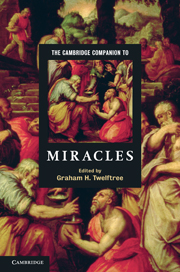Book contents
- Frontmatter
- Introduction
- Part I Fundamental issues
- Part II Miracles in antiquity and the Middle Ages
- Part III Miracles and major religions
- 9 Miracles in traditional religions
- 10 Miracles in Hinduism
- 11 Miracles in Islam
- 12 Tales Of Miraculous Teachings: Miracles In Early Indian Buddhism
- 13 Miracles in Christianity
- 14 Miracles in Jewish philosophy
- Part IV Miracle today
- Index
12 - Tales Of Miraculous Teachings: Miracles In Early Indian Buddhism
from Part III - Miracles and major religions
Published online by Cambridge University Press: 28 May 2011
- Frontmatter
- Introduction
- Part I Fundamental issues
- Part II Miracles in antiquity and the Middle Ages
- Part III Miracles and major religions
- 9 Miracles in traditional religions
- 10 Miracles in Hinduism
- 11 Miracles in Islam
- 12 Tales Of Miraculous Teachings: Miracles In Early Indian Buddhism
- 13 Miracles in Christianity
- 14 Miracles in Jewish philosophy
- Part IV Miracle today
- Index
Summary
From its beginnings in the fourth or third century BCE, Buddhist literature abounds in tales of miracles (Sanskrit prātihārya; Pali pāṭihāriya). From the early centuries BCE these miracles are depicted in the stone reliefs on Buddhist monuments across India. For the Chinese pilgrims Faxian and Xuanzang, visiting India in the fifth and seventh centuries CE respectively, stories of the miracles performed by the Buddha and his disciples informed the very landscape of Buddhist pilgrimage sites as well as the imaginations of Buddhist pilgrims.
The present chapter does not attempt to survey miracle across the Buddhist world and throughout Buddhist history, but rather to highlight some of the themes that characterize the Buddhist approach to the miraculous by focusing on Indian sources that exercised considerable influence as Buddhism spread beyond the India and across Asia. While such an approach has the disadvantage of leaving in the shadows much that is colourful and distinctive in the tales of the miraculous in the Buddhist traditions of East and Southeast Asia, it has the advantage of mapping out a common ground that these diverse traditions might recognize.
The earliest phase of Buddhist literature (fourth to first centuries bce) takes the form of two sets of texts: (1) the collections (nikāya, āgama) of the Buddha’s sayings (sutta, sūtra) and (2) monastic rules (vinaya). Both sets are ‘canonical’ in that they are regarded as the authoritative ‘Word of the Buddha’ (buddha-vacana). They have come down to us in part or in full in various recensions in ancient Indian languages and in Chinese and Tibetan translation. A second phase of Indian Buddhist literature involved the production of the Abhidharma texts and Mahāyāna sūtras (second century bce to fourth centuries ce) as well as, from the second century ce onwards, exegetical works of the various Indian schools of Buddhist thought, including the Mahāyāna.
- Type
- Chapter
- Information
- The Cambridge Companion to Miracles , pp. 216 - 234Publisher: Cambridge University PressPrint publication year: 2011
- 4
- Cited by



